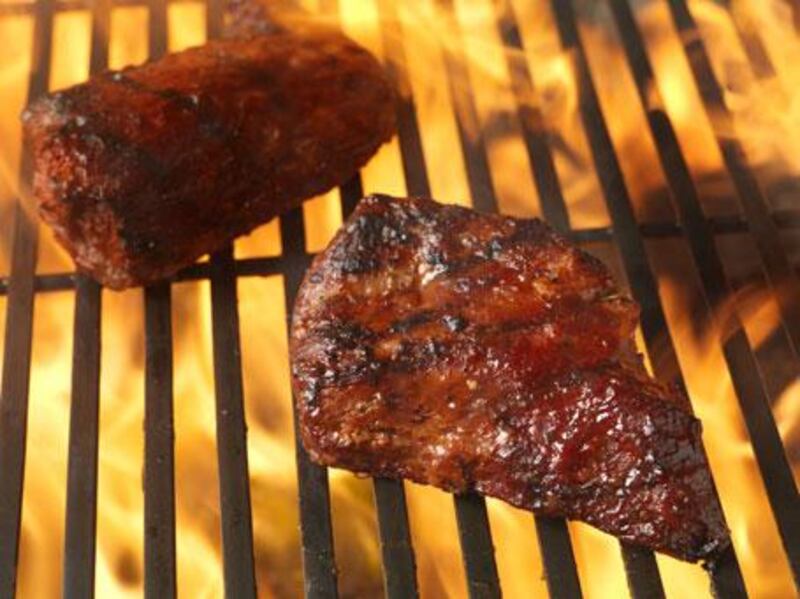"I could tell you, but then I'd have to kill you," jokes the pit master in earnest, like it's the first time he's used that line. I laugh like it's the first time I've heard it. He turns his back to me and resumes his basting duties; I turn my back to him and roll my eyes. There's no denying that I find it vexing when someone who lives for food won't talk to me about his or her favourite topic. In this case, I'm a fawning fan on the pit master's side, having only asked him what it is that makes the sauce on his barbecued beef brisket so mind-bendingly delicious. I'm neither on the hunt for a secret recipe nor for rental space in the building across the street for a rival barbecue joint.
If there is a key to immortality, I'd be willing to bet that it's buried within the pages of an enormous binder of collected recipes. As immeasurably valuable as our oral traditions are, especially in the UAE, how many of us were truly prepared for our grandparents to die just when they did? Recipes that haven't been recorded are often buried with the people who kept them alive. So I sit back and savour the tender shreds of sweet, smoky brisket and steal a look at the pit master, who is waddling back to the till, sweaty and breathless. He's hugely overweight and I wonder, idly (and a little sadistically), if he has kids, and if they'll know how to keep his legacy and the family business alive if he were to keel over by the fire pit tomorrow.
It's a good thing there are so many great things to cook and eat in the world, because I like to do a lot of both. If all great cooks took issue with sharing the secrets to their signature dishes, we'd see a different attitude towards food, cooking and dining. A few ironic and less oblique twists come to mind. Ten people can follow the same recipe, for roast chicken or chocolate brownies, but the results will invariably be different. Also, it's often the compulsion to preserve the uniqueness of one's own history that holds back the urge to share, when if anything, sharing helps to sustain the longevity of that history. And finally, our focus on originality seems a little absurd given that it's almost impossible to trace the true origins of anything - and though the simple act of rewording the instructions in a recipe are sufficient to bypass copyright laws, it doesn't make it ethical or professional to do so without crediting the creator of the dish.
When I've fiddled with someone else's recipe, I'm careful to always mention that I've done so; not to be self-aggrandising but to be candid, and because it inoculates the recipe against my personal mishaps. As much as I respect that someone who makes a living as a cook might think twice about sharing the secret to his or her best-selling dishes, if Marcella Hazan, Jacques Pépin and scores of successful restaurateurs are able to share their magic, I have a hard time believing I should not.
In With Bold Knife and Fork, MFK Fisher writes "A recipe is supposed to be a formula, a means prescribed for producing a desired result, whether that be an atomic weapon, a well-trained Pekingese, or an omelet. There can be no frills about it, no ambiguities ... and above all no 'little secrets'". My personal policy is to always share information, though my recipes are usually just a set of loosely followed guidelines punctuated with extremely specific instructions. With the exception of pastry, I sometimes just find it tedious to follow a recipe from A to Z, and when the final result is catastrophic, it's nobody's fault but my own. But when the results are successful and a recipe is requested, I either write out what I did or utilise my preferred approach: a redux, replete with demonstration.
The works of the pastry chef Claudia Fleming, the poet Dylan Thomas and the fashion designer Alberta Ferretti all have instantly recognisable aesthetics that I love; a signature is meant to evoke and encapsulate an individual's style, attitude and philosophy. Your mother's signature dish might have been as prosaic or as transcendental as the pineapple-upside-down cake she cooked for every special occasion during the first 20 years of our life. Your best friend's might be fried egg sandwiches that are the only thing she cooks, and that she assembles every Christmas morning, as taught her by her father. A signature dish can be as pivotal as an iconic dish that has built a restaurant empire and has inspired thousands of counterfeits. What marks out a signature dish in the end is longevity - rather than how good it tastes.





